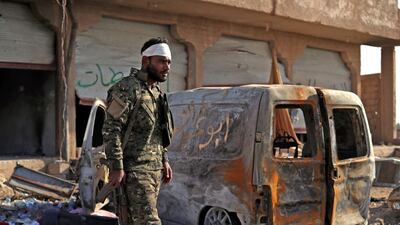Since they first formed in 2015, Syrian Democratic Forces have trodden a careful path on precarious ground, made all the more treacherous because of internal divisions, inter-communal violence and opposition from Turkey. Yet despite this minefield of interests, the US-backed coalition of Kurds, Syrians and Arabs successfully managed to recapture Manbij, Tabqa and Raqqa from ISIS and is now on the threshold of seizing the final terrorist stronghold, the village of Baghouz. In addition to battling extremists, the SDF worked to establish legislative and military councils and earned praise from various American and European officials who engaged with them. In 2017, US commander Raymond Thomas, who told the Aspen Security Forum that they were ready to govern responsibly. Yet now, despite playing a vital role in depriving ISIS of land control, their future hangs in the balance. Recognition of their triumphs threatens to be obliterated as they find themselves at the behest of self-serving competing regional and global powers operating in Syria. The SDF now face the prospect of losing lands held in northern Syria and a Turkish onslaught.
Ankara considers the YPG, which dominates the SDF, to be a terrorist organisation because of its affiliation with PKK militants within Turkey’s borders. Comments last week by Turkish defence minister Helusi Akar – who vowed intervention in SDF lands in northern Syria – and demands from Ankara to solely monitor the northern borderlands have left the group appealing for protection. The force cannot be abandoned in their hour of need.
US President Donald Trump's shock decision in December to withdraw 2,000 troops from Syria threatens their existence and strips them of protection. It also leaves them with few options, hence their mooted contingency plan of approaching the Syrian regime for protection – a scheme that has drawn the ire of US general Paul LaCamera, who promised to sever ties should they partner with the regime or its Russian backers. Yet, few immediate options remain for the SDF.
As Ahmed Aboul Gheit, the Arab League secretary general, said at the Munich Security Conference, they should be supported in establishing control over their territories. He rejected suggestions that Turkish or European forces should be drafted in to police SDF lands. His statement rightly recognised those who applied the antidote to the poison of ISIS. It is a message that the rest of the world should heed.

